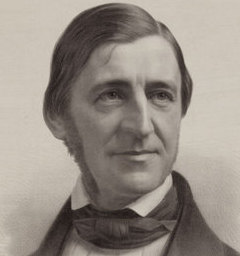“Be true to your own act, and congratulate yourself if you have done some thing strange and extravagant, and broken the monotony of a decorous age. It was a high counsel that I once heard given to a young person, ‘Always do what you are afraid to do.’ A simple manly character need never make an apology…” –Ralph Waldo Emerson
It was perhaps these words by renowned thinker Ralph Waldo Emerson that gave Charley Parkhurst that push towards the West, disguising herself as a man and leaving her past behind. Letting go of all fear, the townspeople’s gossip in Rhode Island, the pain of losing her family; it only fueled her desire to do something – anything – with her life, for herself, without having to apologize for it.
 Emerson’s independent thinking was thought revolutionary and risqué during that time, as was no doubt Charley’s preferred lifestyle. Published from 1841 through 1844 in two volumes, Emerson’s Essays brings together a collection of the philosopher’s most popular and sensational idealistic concepts, including the Over-Soul, where he details the individual Self as part of a universal All. Accused of atheism for these notions, Emerson wasn’t taking away power from the “One True God” Catholicism believed, but was rather giving humankind a transcendental power in return; perhaps giving society more credit than it was due in his time.
Emerson’s independent thinking was thought revolutionary and risqué during that time, as was no doubt Charley’s preferred lifestyle. Published from 1841 through 1844 in two volumes, Emerson’s Essays brings together a collection of the philosopher’s most popular and sensational idealistic concepts, including the Over-Soul, where he details the individual Self as part of a universal All. Accused of atheism for these notions, Emerson wasn’t taking away power from the “One True God” Catholicism believed, but was rather giving humankind a transcendental power in return; perhaps giving society more credit than it was due in his time.
Charley Parkhurst was no doubt a powerful figure in history. She was driven by an independence and a strong sense of individualism not often found in women during her time. Women were supposed to be meek and prudent, obedient and quiet. Charley did not agree.
“ ’This one mysterious life you got, what you gonna do with it?’… I figure you either put your arms around it an be free or you don’t and you live feeling like you missed something but you don’t know what it was…”
Karen Kondazian; The Whip, p. 96
As most of her reading lessons included Emerson’s Essays, as is presumed from the few belongings she left behind in her death, she was exposed to this sort of independent thinking and enlightenment from a very young age.
Although a great influence in today’s philosophical world, Emerson’s own words have been greatly misinterpreted, as any great figure in history. The most popularly misquoted verse from his journal is:
“I trust a good deal to common fame, as we all must. If a man has good corn, or wood, or boards, or pigs to sell, or can make better chairs or knives, crucibles or church organs than anybody else, you will find a broad hard-beaten road to his house, though it be in the woods.”
Different variations of this phrase have been misconstrued, and attributed to Emerson in speeches, sermons, and other little-researched works. He’s also been quoted as saying: “Treat a man as he is, and he will remain as he is. Treat a man as he could be, and he will become what he should be.” when the real quote goes: “If we treat people as they are, we make them worse. If we treat people as they ought to be, we help them become what they are capable of becoming.” Oddly enough, Emerson never said this. It was actually German writer and physicist Goethe.











Speak Your Mind